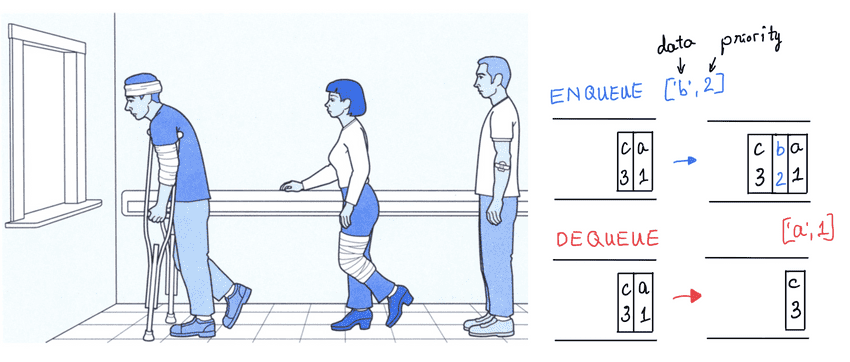This tutorial is a part of the Data Structures and Algorithms class:
- Priority Queue in real life
- Build Priority Queue data structure
- How to insert/delete/access/search data
- How fast to insert/delete/access/search data
Priority Queue in real life
Priority Queue data structure:
- mimics a queue of things in real life with different urgencies. The more urgent, the higher the priority. Example: a queue of patients in an emergency room.
- Each element in the queue has its own priority. Example:
['a', 1]-> data'a', (highest) priority1. - Higher priority element gets out first. Elements with the same priority follow: First-In-First-Out (
FIFO). - Example applications: wifi network bandwidth management, computer CPU time management, ...
Build Priority Queue data structure
lecture-9/priority-queue-data-structure.js
// build Priority Queue data structure
// naive approach (not the best optimal solution)
class PriorityQueue {
constructor() {
this.queue = []
}
// add data to the queue, O(n)
// using `heap` data structure will give O(logn)
enqueue(element) {
// queue is empty, add element immediately
if(this.queue === 0) {
return this.queue.push(element)
}
// queue is not empty,
// go through all existing element,
// add element right after existing element which has the same priority
// 1 is highest priority
var added = false;
for(let i = 0; i < this.queue.length; i ++) {
if(element[1] < this.queue[i][1]) {
this.queue.splice(i, 0, element);
added = true;
break;
}
}
// went through all existing elements but they all have higher priority,
// add the element to the end of the queue
if(!added) {
this.queue.push(element)
}
return element
}
// remove first element in queue
// Note: O(n) with this implementation (for simplicity),
// If we use `heap` data structure, we'll have O(logn)
dequeue() {
return this.queue.shift()
}
// see queue size, O(1)
size() {
return this.queue.length
}
// see first element in line, O(1)
peek() {
return this.queue[0]
}
// see all data in the queue, O(1)
print() {
console.log(this.queue)
}
}
// create a priority queue
const priorityQueue = new PriorityQueue()
priorityQueue.print() // []$ node priority-queue-data-structure.js
[]How to insert/delete/access/search data
lecture-9/priority-queue-data-structure.js
// insert
console.log(priorityQueue.enqueue(['c', 3])) // [ 'c', 3 ]
console.log(priorityQueue.enqueue(['b', 2])) // [ 'b', 2 ]
priorityQueue.print() // [ [ 'b', 2 ], [ 'c', 3 ] ]
console.log(priorityQueue.enqueue(['a', 1])) // [ 'a', 1 ]
priorityQueue.print() // [ [ 'a', 1 ], [ 'b', 2 ], [ 'c', 3 ] ]
console.log(priorityQueue.enqueue([{'zyz': 123 }, 4])) // [ { zyz: 123 }, 4 ]
priorityQueue.print() // [ [ 'a', 1 ], [ 'b', 2 ], [ 'c', 3 ], [ { zyz: 123 }, 4 ] ]
console.log(priorityQueue.enqueue(['d', 2])) // [ 'd', 2 ]
priorityQueue.print() // [ [ 'a', 1 ], [ 'b', 2 ], [ 'd', 2 ], [ 'c', 3 ], [ { zyz: 123 }, 4 ] ]
// delete
console.log(priorityQueue.dequeue()) // [ 'a', 1 ]
priorityQueue.print() // [ [ 'b', 2 ], [ 'd', 2 ], [ 'c', 3 ], [ { zyz: 123 }, 4 ] ]
// peek
console.log(priorityQueue.peek()) // [ 'b', 2 ]
// size
console.log(priorityQueue.size()) // 4$ node priority-queue-data-structure.js
[ 'c', 3 ]
[ 'b', 2 ]
[ [ 'b', 2 ], [ 'c', 3 ] ]
[ 'a', 1 ]
[ [ 'a', 1 ], [ 'b', 2 ], [ 'c', 3 ] ]
[ { zyz: 123 }, 4 ]
[ [ 'a', 1 ], [ 'b', 2 ], [ 'c', 3 ], [ { zyz: 123 }, 4 ] ]
[ 'd', 2 ]
[ [ 'a', 1 ], [ 'b', 2 ], [ 'd', 2 ], [ 'c', 3 ], [ { zyz: 123 }, 4 ] ]
[ 'a', 1 ]
[ [ 'b', 2 ], [ 'd', 2 ], [ 'c', 3 ], [ { zyz: 123 }, 4 ] ]
[ 'b', 2 ]
4How fast to insert/delete/access/search data
| Data Structure | Insert | Delete | Access | Search |
|---|---|---|---|---|
| Priority Queue | O(logn): enqueue |
O(logn): dequeue |
N/A | N/A |
⬆️ Time complexity (worst case) per operation
Real life interview questions
- What is the Priority Queue data structure usually used for? Give 3 different examples.
- What is the distinct feature of Priority Queue compared to a normal Queue ?
- Write your own Priority Queue data structure with these operations:
enqueue,dequeue,peek,size,print. - How do you insert/delete/access/search with Priority Queue data structure?
- What is the Time Complexity of Priority Queue data structure on insert/delete/access/search operation?
-
Implement real life emergency room queue:
- Input:
- patients with different priorities.
- Output:
- patients with more serious injuries are served first.
- the priority of a patient who is in the queue first, but does not get out before a patient who gets in the queue later, will be increased by
1every time that event occurs, this increase capped at priority2.

